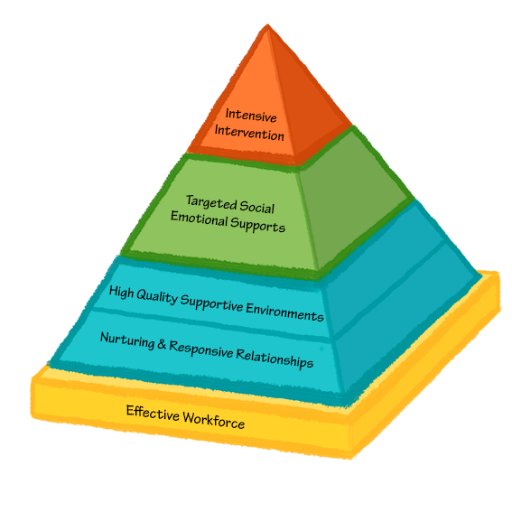

#Unpacking the pyramid model professional
Outcomes from the Teaching Pyramid Professional Development Professional development packages offered are individualized and tailored to the needs of the school district, program, or cohort of programs, but must include all of the recommended Teaching Pyramid components. An early elementary version (K-3) will be available soon. There is a preschool version as well as a version for infant/toddler programs. Through a partnership with CSEFEL, WestEd Center for Child & Family Studies, San Marcos Office (WestEd), is able to offer the comprehensive, program-wide Teaching Pyramid Framework to districts and organizations. For a more extensive description of the Teaching Pyramid framework as adapted for California, see WestEd’s Case Study Final Report (PDF) conducted after implementation of the Teaching Pyramid framework in the First 5 LA School Readiness programs. The Teaching Pyramid is a systematic framework developed by CSEFEL that incorporates Early Childhood Positive Behavior Support (EC-PBS) through promoting social-emotional development, providing support for children’s appropriate behavior, preventing challenging behavior, and addressing problematic behavior. The Center has developed and disseminated evidence-based, user-friendly information to help early childhood educators meet the needs of the growing number of children with challenging behaviors and mental health challenges in child care and Head Start programs. The Center on the Social and Emotional Foundations for Early Learning (CSEFEL) is a national center focused on strengthening the capacity of child care and Head Start programs to improve the social and emotional outcomes of young children. This engaging presentation provides Pyramid Model strategies you can start using right away to promote successful family partnerships in your early childhood program.Social-emotional development is foundational for learning and development in young children, and California is committed to promoting and supporting healthy social-emotional development in all of its children Joseph, Ph.D., BCBA-D, and Meghan Von Der Embse, Ed.S., NCSP.Ĭonnecting and collaborating with families of young children is a critical success factor in early care and education classrooms. Presented by Alana Griffin Schnitz, Ph.D., BCBA , Jaclyn D. Promoting Positive Family Partnerships within the Pyramid Model
#Unpacking the pyramid model how to
Learn how to teach friendship skills through strategies and supports for entire classrooms, small groups and partners, and individual students.Discover two key indicators for determining the presence of a friendship between young children.Meyer, Milam, & Ostrosky discuss how educators can apply the Pyramid Model approach to teach friendship skills throughout the school day. Strong friendship skills are critical for young children to develop in their first years of school, but how can busy educators nurture these skills in children with and without disabilities? Find out in this engaging and practical presentation.

Unpacking the Pyramid Model: Friendship Skills and Strategies for Teaching Them Get effective strategies for supporting children within daily routines.Learn the differences between daily events, activities, and routines.Review important guidelines for ensuring well-balanced classroom schedules.Discover four key questions children should be able to answer across their day.The three expert presenters reveal how to increase engagement and support children’s learning by taking time to carefully construct a classroom schedule and develop consistent, predictable Routines within Routines within Routines. How can schedules and routines boost engagement and learning in early childhood classrooms? Get immediately useful answers in this coffee chat. Get strategies for sharing behavior expectations with families and collaborating with them effectivelyīoosting Child Engagement Through Classroom Schedules and Routines.Discover new strategies to teach young children about behavior expectations and rules.Learn strategies for creating both expectations and rules for early childhood classrooms.Get clear working definitions of “expectations” vs.Presented by Denise Perez Binder, this webinar shows early educators how to use behavior expectations and rules as a powerful strategy for strengthening young children’s social-emotional skills, which will lead to fewer behavior challenges down the line. Teaching Expectations and Rules in Early Childhood Classrooms and Programsĭiscover how to create appropriate rules and expectations for behavior-and teach them effectively in your classroom or program.


 0 kommentar(er)
0 kommentar(er)
